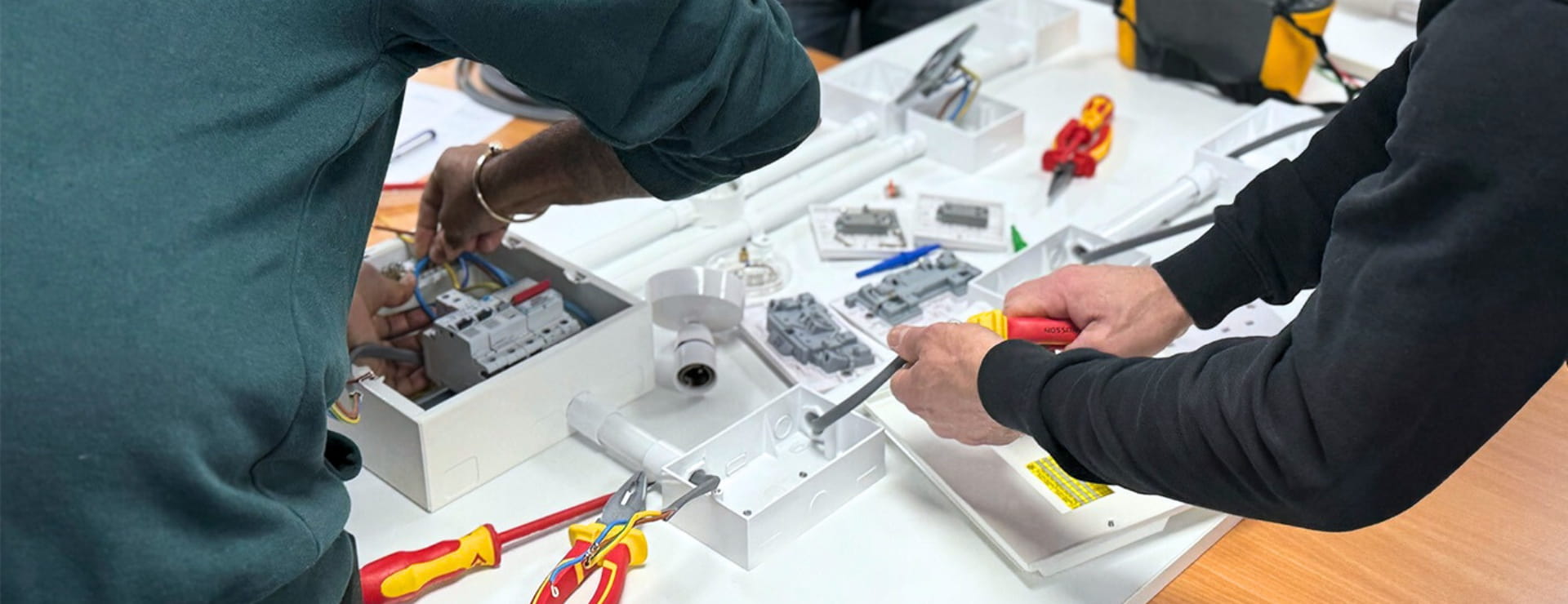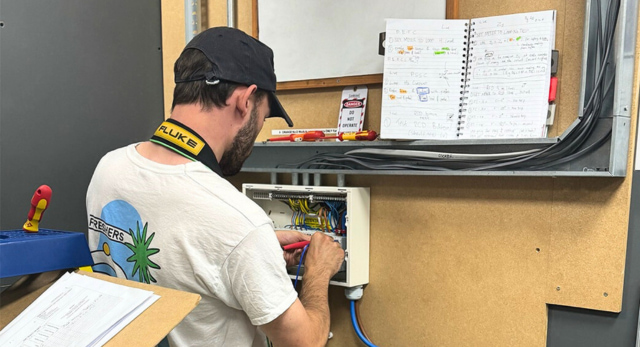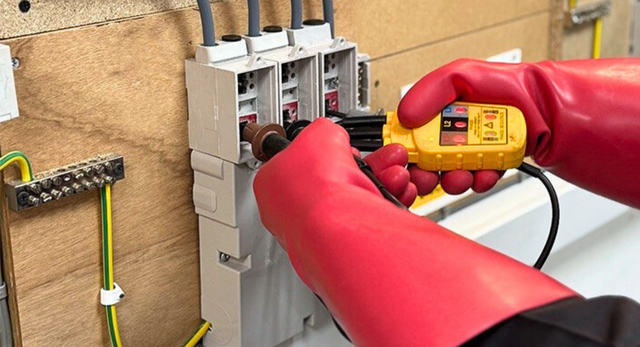Thinking about changing career to become an electrician in 2026? Whether you’re looking for a reliable trade, better earnings, or a hands-on role with strong job security, retraining as an electrician is a smart choice. In this article, you’ll find everything you need to know: how to retrain as an electrician, the qualifications and training routes available, costs, timescales, job prospects, and how Logic4training’s trusted courses support your success. Whether you’re a complete beginner, career changer, or tradesperson wanting to upskill, start your journey to a future-proof, in-demand profession in the UK’s growing electrical industry with advice from the training experts at Logic4training.

Why Retrain as an Electrician in 2026?
Electricians are in high demand. According to the UK Trade Skill Index, over 100,000 new electricians will be needed by 2032. An ageing workforce and ramped-up demand for new housing, retrofitting, and renewable tech (solar PV, EV charging) mean employers are on the hunt for qualified sparks.
Top reasons to consider electrics:
- Excellent earning potential: Qualified electricians routinely earn £25,000-£40,000+, with the self-employed and specialists earning even more.
- Huge variety: Domestic or commercial, big sites or homes, or specialisms like renewables, there’s a niche for everyone.
- Job security: Skills shortages mean you’ll have plenty of options wherever you are in the UK.
- Flexible careers: Go self-employed, join leading companies, or progress to design, inspection, or teaching.
- Job satisfaction: Solve real problems, keep people safe, and see the results of your work every day.
- AI Job displacement: Over the next couple of years, AI will start to replace people for computer-based job roles. The trades are in a unique position where they require a number of skills that AI can’t replace. You can learn more about AI Job Losses & Why Tradespeople Are Safe from AI.
The Main Training Routes to Becoming an Electrician
1. Electrical Courses
Electrical training courses are especially well-suited for career changers and adults who may already have some work experience but are new to the electrical trade. This training route is also ideal if you’re looking to focus on electrical work within residential properties rather than on large commercial sites. Typically, an electrical course is designed to be intensive, typically taking just 4 to 6 weeks to complete when studied full-time. This condensed format enables you to quickly develop the essential skills required to start working as a domestic electrician while minimising the time away from your current job or other commitments. By the end of an electrical course, you’ll have a solid foundation and be well-equipped to move directly into the electrical industry, with the option to progress to further qualifications as your experience grows.
It is important to know that with training courses, the quality of the course is solely dependent on the quality and effort from the training provider. Beware that there are training providers out there that offer fast-track electrician courses that are not up to the standard of training you’d expect, especially for the price that they charge.
At Logic4training, we pride ourselves on delivering the optimal training experience. We have also created two articles that go into more depth on the topics of fast-track electrician courses and online learning vs in-person training in the trades.
Key qualifications include:
- Level 2 and Level 3 Electrical Diplomas in Electrical Installations
- The 18th Edition Wiring Regulations qualification
- Level 3 NVQ in Electrical Installations & Maintenance
- The AM2 assessment
At Logic4training, we have created electrical training packages that include these core electrical qualifications.
Why choose this route?
Opting for an electrical training course is ideal if you want a swift career transition with minimal downtime, especially for those wishing to retrain or upskill while balancing other personal or professional commitments. You benefit from hands-on training, up-to-date teaching on safety and regulations, and the chance to start earning sooner.
2. Electrical Apprenticeships
An electrical apprenticeship is ideal for those who are just beginning their career or for anyone willing to invest a few years in comprehensive training. During an apprenticeship, you’ll work alongside a qualified employer, often as part of a team, gaining practical, hands-on experience on real jobs. At the same time, you’ll study at a college or an approved training centre, where you’ll learn essential theory and develop technical skills connected to electrical installation, safety regulations, and problem-solving.
Typically, an electrical apprenticeship takes between two and four years to complete, with a mix of classroom learning and on-site work ensuring you’re ready for the demands of the industry. This route allows you to earn a wage while you train, build your confidence working in the real world, and create valuable professional connections that often lead directly to employment upon qualifying.
Key qualifications include:
- Level 3 NVQ Diploma in Electrotechnical Services (Electrical Maintenance)
- Level 3 NVQ Diploma in Installing Electrotechnical Systems & Equipment
- Level 3 Diploma in Electrical Installations (Buildings and Structures)
Why choose this route?
One of the main advantages of an electrical apprenticeship is that you earn a wage while you learn, allowing you to gain valuable skills without the financial strain of full-time study. Throughout your training, you’ll be immersed in real-world working environments, which not only builds your practical abilities but also helps you develop confidence as you handle genuine electrical installations and challenges.
Additionally, the relationships you form with colleagues and supervisors during your apprenticeship provide important networking opportunities that can support your career progression. Importantly, by combining classroom knowledge with hands-on experience, an apprenticeship ensures you achieve the full competency required to take on more complex roles and responsibilities in the electrical industry.
3. On-the-Job Learning
Some people start as an electrician’s mate or improver, working alongside qualified electricians and picking up skills on real jobs. This can be a practical way into the trade if you already have contacts in the industry or are moving across from another construction role.
On-the-job learning exposes you to day-to-day tasks such as running cables, fitting accessories, chasing walls, fault-finding and assisting with testing, giving you a realistic view of what the work involves. You’ll also gain insight into how jobs are priced, how sites are managed, and how electricians interact with customers and other trades.
However, industry regulations and Competent Person Schemes still require formal qualifications if you want to sign off your own work, register as a domestic installer, or work independently on site. Relying on experience alone can limit your earning potential and the type of work you are allowed to carry out legally.
For this reason, we strongly recommend combining on-the-job experience with a recognised training course and structured qualifications. A common approach is to work as an electrician’s mate while completing key courses such as Domestic Electrical Installer, 18th Edition and inspection and testing, then progressing to a full Level 3 qualification or Experienced Worker Assessment as your portfolio grows.
Why choose this route?
This route suits career changers who can secure work with a local electrician or contractor and want to “earn while they learn” rather than study full-time in the classroom. It’s also a good option for labourers or tradespeople in related areas (such as general building, plumbing or maintenance) who already understand site work and want to transition into electrical installation in a more gradual, hands-on way.
3. Domestic installer route (domestic only)
If your main goal is to work in people’s homes, for example, rewiring, consumer unit changes and adding new circuits, there are structured domestic-only training routes that focus on dwellings rather than large commercial or industrial sites. These are ideal for career changers who want to specialise in domestic installation and get up and running quickly in the residential market.
A Domestic Electrical Installer course is typically delivered as an intensive programme, often running for around 27 days (roughly six weeks) and split into three integrated modules. Across this period you will cover electrical fundamentals, domestic installation techniques and the building regulations that apply to work in homes, giving you the core skills to install, alter and extend domestic electrical systems safely.
Domestic installer training also includes inspection and testing for domestic installations, so you can verify that your work is safe and compliant before it is energised. When this route is combined with the 18th Edition Wiring Regulations and any further required assessment, it can lead to registration with a Competent Person Scheme, enabling you to sign off notifiable domestic work yourself. However, it’s important to understand that this domestic-only pathway is not the same as achieving full NVQ Level 3 and Gold Card status, which are required for many commercial and industrial site roles.
Why choose this route?
This route suits those who want to focus on home-based projects, build a local customer base and start trading sooner without immediately pursuing the full site-based electrician pathway. Many learners later choose to build on this foundation with additional qualifications and experience if they decide to expand into wider electrotechnical work.
5. Experienced Worker Assessment (for existing electricians)
The Experienced Worker Assessment (EWA) route is designed for practising electricians who have been working in the industry for several years but never completed a full NVQ Level 3. Instead of starting from scratch, this pathway recognises the skills and experience you already have, helping you work towards full qualification more efficiently.
If you are looking to retain as an electrician, this route will probably not be suitable for you as you’ll typically need at least 5 years of verifiable experience as a practising electrician, covering a mix of domestic, commercial and industrial work. You must also be able to evidence that you have already carried out a broad range of installation and inspection/testing tasks, such as installing circuits, consumer unit changes, fault-finding and certification.
Once you meet the entry requirements, you’ll work through three main stages:
- Build a retrospective NVQ Level 3 portfolio, using real jobs you’ve already completed to demonstrate competence across the required performance criteria.
- Complete any gap training needed to bring your knowledge up to current standards – most commonly the 18th Edition Wiring Regulations and an Inspection & Testing qualification.
- Take the AM2E final assessment, a practical and knowledge-based test that confirms you can work safely and competently to industry-recognised standards.
Why choose this route?
The Experienced Worker Assessment is ideal if you are already working as an electrician but want to achieve a recognised Level 3 NVQ and become fully qualified without repeating training you do not need. It allows you to convert your existing experience into an industry-recognised qualification, improve your prospects with employers and Competent Person Schemes, and position yourself for future progression into areas such as inspection, testing and specialist electrical work.
How Long Does It Take to Retrain as an Electrician?
| Route | Typical duration | Best for | Good to know |
|---|---|---|---|
| Electrical courses | Typically 1-3 years to reach fully qualified status, depending on progression | Adult career changers and those wanting an intensive, classroom‑based route into domestic or full‑scope work | Quality varies hugely between providers; avoid poor‑value fast‑track/online‑only options and choose in‑person, workshop‑led training from an established provider like Logic4training. |
| Electrical apprenticeships | Typically 2-4 years, combining work and study | School leavers and those happy to invest several years in “earn while you learn” training | You need an employer to sponsor you, and programme length depends on work opportunities and college/training schedules. |
| On‑the‑job learning | Highly variable, but similar to the electrical courses. | Industry switchers and improvers who can secure work as an electrician’s mate while training | Works best when combined with structured courses (e.g. Domestic Installer, 18th Edition, inspection & testing) rather than relying on experience alone. |
| Domestic installer route (homes) | Around 6 weeks intensive centre‑based training, plus 6-18 months building experience | Adult career changers and multi‑skilled trades focused mainly on domestic work in people’s homes | Fast to get started in the residential market, but initially limited to domestic work; extra training needed for wider commercial/industrial roles and future CPS/Gold Card changes. |
| Experienced Worker Assessment | Minimum ~6 months once you meet entry requirements | Time‑served electricians with 3-5+ years’ verifiable experience but no full Level 3 qualification | Not suitable for new entrants; you must evidence substantial previous work and usually hold existing qualifications to be accepted. |
- Logic4training’s New Entrant Electrical Route can be completed full-time or on weekends. Following this initial training, you will need to gain industry experience and build a portfolio of work before completing your final assessments (AM2). From here, you can apply for your ECS Gold Card and sign up to a Competent Person Scheme. This process takes roughly 1-3 years.
- Apprenticeships take longer, but it depends on the level of NVQ you are aiming to achieve.
We have covered this topic in depth in our How Long Does it Take to Become an Electrician? article.
Important Note: From January 2026, the requirements for joining Competent Person Schemes, which give you legal recognition to carry out electrical work independently in homes, will change. If you want to find out more information regarding this change, please contact our team on 020 8845 7222.
How Much Does It Cost?
Costs vary based on route and provider, but expect:
- Training courses: Typically between £2,500 and £6,000. At Logic4training, our New Entrant Domestic Electrical Installer packages range from £2995+VAT to £7995+VAT.
- Upskill qualifications: Part P, 18th Edition, inspection and testing, safe isolation, PAT testing, or EV charging installer courses from £200 to £1500.
- Apprenticeships: Often free for younger entrants, or funded by government/employer for adults, though you’ll earn a lower wage while training.
- On-the-job (plumber’s mate): There are small or even no upfront costs, but you’ll need to invest in formal training to progress further down the line to be able to sign off your own work.
Finance plans and flexible options are available at Logic4training. See our electrical course page for our latest prices.

What Qualifications Do You Need to Become an Electrician in the UK?
If you want to become a domestic or fully qualified electrician in the UK, there are several core qualifications that usually form your training journey. Together, these build your technical knowledge, practical skills and professional sign‑off, allowing you to work safely, progress your career and eventually achieve credentials such as the ECS Gold Card.
Essential Qualifications:
- Level 2 and Level 3 Electrical Diplomas in Electrical Installations
A common starting point is the City & Guilds 2365 Level 2 and Level 3 Diplomas in Electrical Installations. These classroom and workshop‑based diplomas provide the technical foundation for aspiring electricians and career changers, covering installation theory, health and safety, wiring systems and practical skills needed to move towards qualified status and, ultimately, an ECS Gold Card. - The 18th Edition Wiring Regulations Qualification
The 18th Edition Wiring Regulations (BS 7671:2018+A2:2022) course is essential for anyone designing, installing or maintaining electrical installations in the UK. This qualification demonstrates that you understand the latest wiring regulations and can apply them in practice, and it is a key requirement for Competent Person Schemes, ECS/JIB Gold Cards and many installation and maintenance roles - Level 3 NVQ in Electrical Installations & Maintenance
Once you have your underpinning diplomas and are working on site, the City & Guilds Level 3 NVQ in Electrical Installation and Maintenance (2357) is the work‑based qualification that proves your real‑world competence. Through on‑site evidence of installation, maintenance, fault‑finding and safety, this NVQ forms the professional benchmark for the industry and is a major step towards being recognised as a fully qualified electrician. - The AM2 assessment
The AM2 assessment (Achievement Measurement 2) is the final module of the Level 3 Electrical NVQ as the practical end-point assessment that brings everything together at the end of your Level 3 NVQ or equivalent route. It tests your ability to install, inspect, test and fault‑find safely and independently in a realistic assessment bay, and passing AM2 is a key milestone on the path to ECS Gold Card status and working unsupervised as a fully qualified electrician.
Additional Qualifications for Progression
If you’re aiming for roles on commercial sites, supervisory responsibilities, or to become an approved contractor, you’ll need further qualifications. These may include:
- Level 3 Certificate in Installing, Testing & Ensuring Compliance of Electrical Installations in Dwellings
- Level 3 Periodic Inspection, Testing, Condition Reporting & Certification of Electrical Installations
- Level 3 PAT Testing qualification
Qualifications to Specialise:
The electrical industry offers growing opportunities to specialise as technology evolves. Logic4training provides additional certification for:
- Electrical inspection and testing: Carry out periodic safety checks and certification or portable appliance testing (PAT).
- Solar photovoltaic (PV) installation: Design, fit, and maintain solar energy systems.
- Electric vehicle (EV) charging points: Install and service EV infrastructure.
- Energy storage systems: Install battery systems for homes and businesses.
These specialist qualifications help you stand out, expand your job options, and meet the needs of new markets in renewable energy and smart technologies.
We have covered this topic in depth in our What Qualifications Do I Need To Be An Electrician? article.
What Does an Electrician Actually Do?
Electricians handle a diverse range of jobs, including:
- Reading and interpreting technical diagrams.
- Pricing and quoting jobs.
- Installing and maintaining electrical wiring, sockets, switches and other fixtures and appliances.
- Testing systems and diagnosing faults.
- Ensuring every job meets strict safety standards.
Work covers domestic installations, commercial properties, schools, factories, and more. Electricians can expect every week to feel different. So no chance of boredom here!
What’s Life Like as an Electrician?
Working as an electrician offers variety and challenge every single day. Depending on your role and specialism, you could spend the morning installing and testing new wiring, fitting consumer units, or upgrading lighting systems in homes or offices. Attention to detail is crucial, making sure every component is fitted safely and up to the current wiring regulations.
You’ll also frequently respond to emergencies, such as electrical faults and in some cases, power outages, where quick thinking and technical expertise are essential. Planned maintenance is just as important as routine checks help prevent problems and keep buildings safe. Many electricians also get involved with upgrades like fitting technology, such as EV charging points, or battery storage solutions. At Logic4training, we have seen the demand for battery storage and solar training continue to grow, showing that there is a demand out there from the public.
Electricians work across a broad range of environments, from construction sites to domestic homes, schools, hospitals, and busy commercial settings. The nature of the job means you could be working solo on small installations or as part of a team on larger projects. On a practical level, success as an electrician demands a strong problem-solving attitude. Additionally, good interpersonal skills are important as you’ll be liaising with customers, other trades, inspectors, or site managers regularly. The job also requires physical stamina, as you may be working at heights, climbing ladders, crawling under floors, or navigating tight spaces. Remaining calm under pressure and maintaining safety at all times are essential traits.
If you want to work as a sole trader, by yourself, marketing your services is also key. You’ll need to communicate clearly about your services, build a brand and communicate in a professional way. Having helped many solo electricians build their careers, we know the importance of brand building. Our most successful candidates have been those who have not only successfully learnt their trade but also dived into learning the marketing side of their trade. We have partnered with Aim High Websites to provide a high-quality website design and hosting service to give our candidates the digital edge.
Ultimately, the work brings both satisfaction and responsibility. You’ll see real results from your efforts, play a role in people’s safety and comfort, and join a respected profession where no two days are ever the same. Electricians enjoy both independence and teamwork, with opportunities to progress, specialise, or run their own businesses as their career develops.
How to Get Started: Step-by-Step
- Research Your Options: Explore the different training routes. This could be an electrical training course, apprenticeships or on-the-job learning.
- Book an Open Day: If the training provider offers an open day, meet the tutors, see the facilities, and get tailored advice in-centre.
- Choose Your Electrical Training Method: If you are looking to complete our electrical training course, please give us a call on 020 8845 7222.
- Get Qualified: Attend your training, complete assessments, and build your portfolio.
- Find Work or Go Self-Employed: Start earning in a secure, respected trade!
Ready to spark a new career? Contact Logic4training today and join thousands who have future-proofed their skills in the UK’s electrical industry.
FAQ
How long does it take to become a fully qualified electrician?
It depends on your route. Apprenticeships take 2-4 years, whereas electrical training courses can get you trading in as little as 4-6 weeks, with portfolio work and further training needed to become fully qualified.
Do I need an apprenticeship to work as an electrician?
No, there are several routes. Fast-track and new entrant courses are ideal for adults and career changers who want to work mostly in domestic settings. Apprenticeships are traditional but not the only option.
What qualifications will I get with Logic4training?
Completing our New Entrant Electrical Installer Course will award you with industry-recognised qualifications such as:
- Domestic Installer (Part P)
- 18th Edition Wiring Regulations
- Initial Verification and Testing certifications
- Level 3 Certificate in Installing, Testing & Ensuring Compliance of Electrical Installations in Dwellings (with our silver and gold electrical packages)
Are Logic4training’s courses open to all ages and backgrounds?
There’s no upper age limit. Courses are designed for adults, career changers, and existing tradespeople looking to upskill. However, you have to be 18 or older to start any Logic4training course.
What are the main risks or challenges of working as an electrician?
Electricians must always manage safety risks, such as working with live electricity, heights, and potentially hazardous environments. The job requires strict attention to detail, ongoing learning to keep up with regulations, and maintaining physical fitness. However, thorough training from Logic4training ensures you are well-prepared to work safely and confidently day-to-day.





